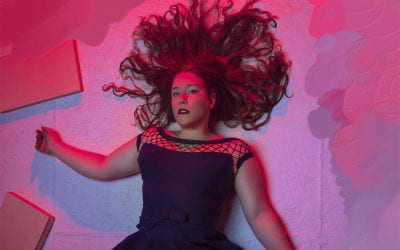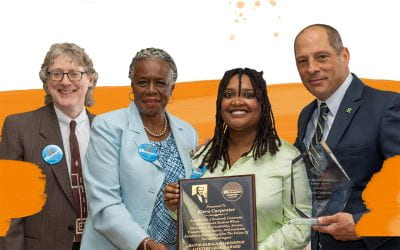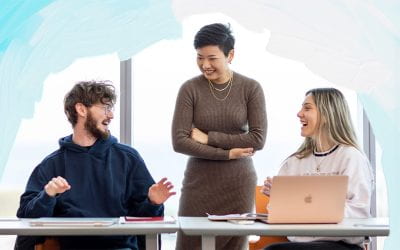Professor honored for exemplifying
“what one educated person can do by standing up for what is right”By Carla Beecher
LaDonna Long, PhD, did not have a good undergraduate experience. When it came time to go to college, the now associate professor of criminal justice and chair of Government, Law and Justice, chose a small liberal arts school in Ohio — a place about as far away culturally as you could get from her South Side childhood home.
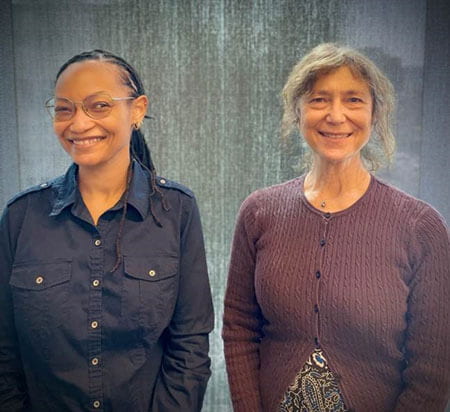
LaDonna Long with Amy Likover, daughter of Frank Untermyer
“It was a culture shock,” she said. “Besides being away from home and my support system, it was rural, predominantly white and of a higher socioeconomic class. It was a challenge. Although I was a smart kid in high school, there just were some things I didn’t know. And the pace was so fast — what I’d normally learn in a year, I was now expected to know in a month. I spent four years catching up to everyone else: it was demoralizing. I didn’t know how to handle the stress, and I ended up having to check myself into the infirmary twice during my last semester. My anxiety over school was making me sick.”
Long believes that graduate school and getting a PhD were nowhere near as hard on her as her undergraduate years. Because of that struggle, Long has made it one of her missions as a teacher to check in with her students to see how they’re coping with the schoolwork … and life in general.
Long believes that graduate school and getting a PhD were nowhere near as hard on her as her undergraduate years. Because of that struggle, Long has made it one of her missions as a teacher to check in with her students to see how they’re coping with the schoolwork … and life in general.
“I don’t make a big deal out of it. I delicately check in with them, maybe talking to them privately after class or sending an email. I just want to offer students options to move forward in whatever thing they may need.”
Her vulnerability and caring, along with her command of a demanding and sensitive subject matter that focuses on women’s experiences with victimization, has earned her her the 2022 Frank Untermyer Excellence in Teaching Award. The award is named for the late Frank Untermyer, associate professor of political science and African studies. It and its stipend recognize Long’s dedication to the craft of teaching, her collaboration and support of colleagues, her pursuit of professional development opportunities and her transfer of those insights and skills into the classroom to enhance student experiences.
Long’s colleague Heather Dalmage, professor of sociology and director of the Mansfield Institute for Social Justice, nominated her for the award.
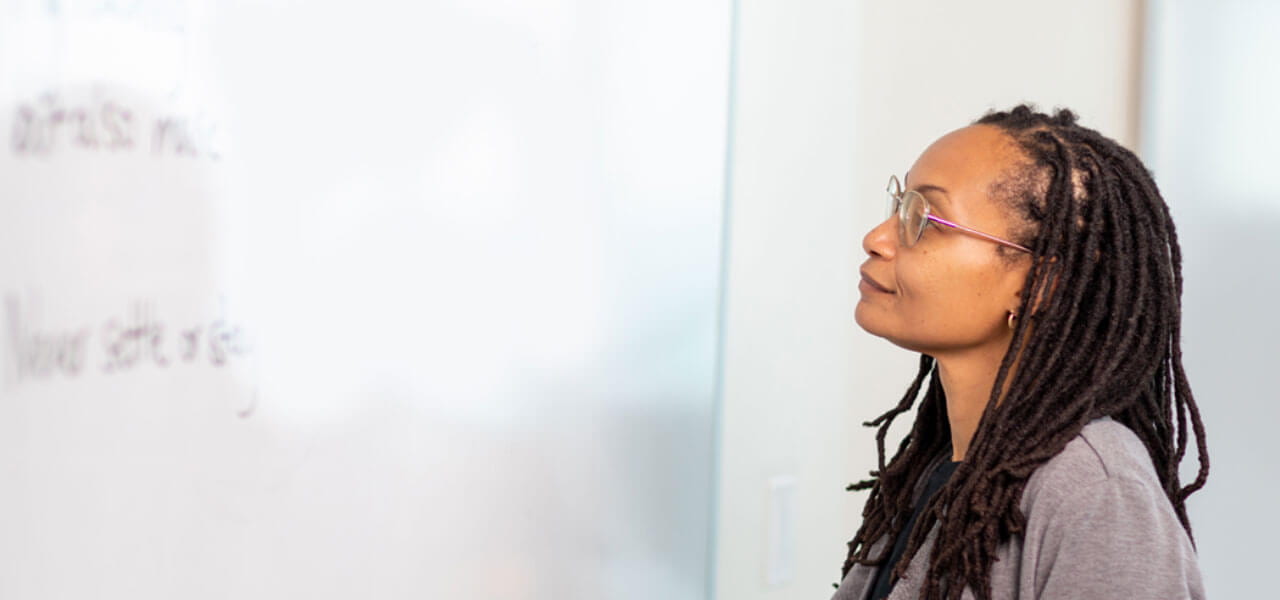
“LaDonna teaches courses about difficult topics — sexual violence and human violence,” Dalmage said. “She is constantly looking for new ways to create a pedagogy that allows her students to learn and understand the emotions involved in dealing with trauma — sometimes even working with students who have been traumatized themselves. She seeks ways to develop her own skills and ideas across a range of interrelated areas, such as her ongoing work in transformative justice. While she’s challenging herself, she’s also bringing it back into the classroom, so students and her colleagues are learning with and from her at the same time.”
Long said that her three teaching goals guide her classroom.
1. She makes sure a student never feels the way she did as an undergraduate.
2. Her teaching should not just instruct students but also make students’ lives better.
3. She vows to never settle or stay stagnant.
“I also regularly check myself and make sure to ask for help when I need it,” she said.
Her current research interest focuses on how restorative justice practices can be used in cases of violent crimes; specifically, how it can be used for sexual assault cases for women of color. She believes that this practice can be useful for those who are interested in alternatives, especially for women of color who may not be comfortable with the criminal justice system.
Long is humbled by the honor. “I see myself as an imperfect teacher who’s always striving for perfection. And, to have someone acknowledge me in any way is absolutely humbling because I struggle sometimes to see myself in that light. I see myself as regular teacher who sometimes gets it right and sometimes not.
“I really do want every student to succeed and see that even though the subject matter is tough, there’s reason for hope.” She said she always remembers the way she felt as a first-generation undergraduate, “so I never want my students to feel that anxious. I thought I was supposed to know everything and was afraid to ask for help because I didn’t want them to think I was a dumb inner-city girl who didn’t know any better. And it’s not just me who’s here for students at Roosevelt. We all are.”
“We want students to know that this university is a safe space,” … “People aren’t going to judge you because of where you come from or your perceived background. The teachers and staff all feel that each student is here for a reason and that they are people who can make a difference in the world. We’re here to help them do that.”
Originally, Long was planning to become a criminal justice practitioner. But her work answering a rape crisis hotline and as a medical advocate sparked her interest in pursuing a PhD in criminology, law and justice. Happily, as part of her doctorate, she was required to teach and found she liked it.
The Untermyer Award honors Long’s many proclivities: nominees are professors who are prolific in their subject area, are innovative in the classroom and combine their teaching with activism.
“Professor Long has gone above and beyond linking teaching to society and social justice,” said Amy Likover, Untermyer’s daughter. “She embodies the values of my father, whose commitment to the Constitution, understanding geopolitics and hope for world peace was rooted, I believe, in his own exceptional professors and admiration for what one educated person can do by standing up for what is right.”
More in this section
Opera’s leading role in transforming gender identity in the arts
Lucia Lucas is a force—both on stage and off. In April, Lucia made history during her debut at the Lyric Opera of Chicago as the first openly transgender person to perform there in a leading role.
Deserving of a truly special honor
Friends of Roosevelt recently gathered to recognize Kiera Carpenter, an aspiring environmental professional, as the inaugural recipient of the Mayor Harold Washington Legacy Scholarship.
In and beyond the multicultural classroom
Professor Yue Li helps students to not only recognize and embrace culture differences, but to see social hierarchies that create privilege and oppression.

